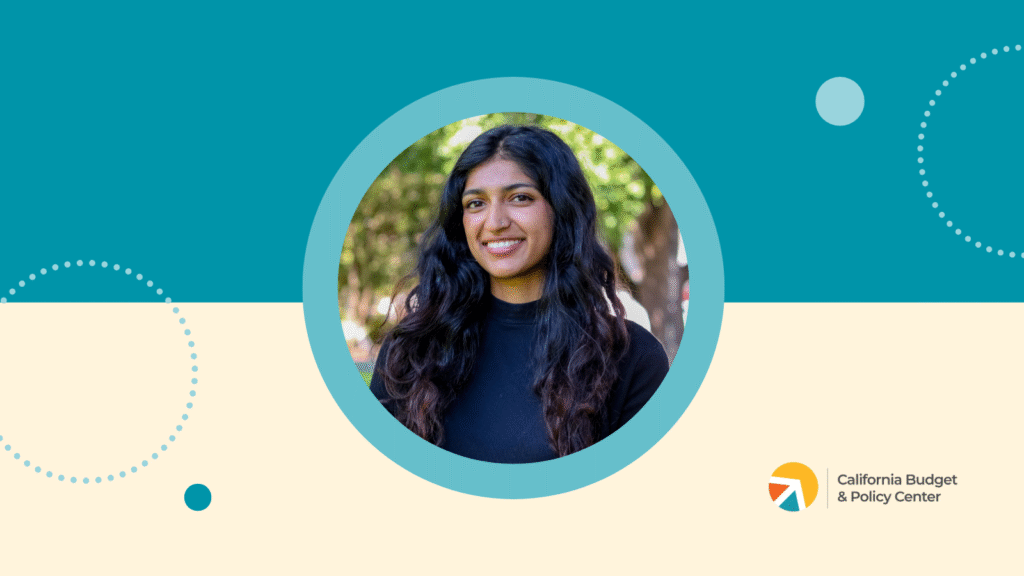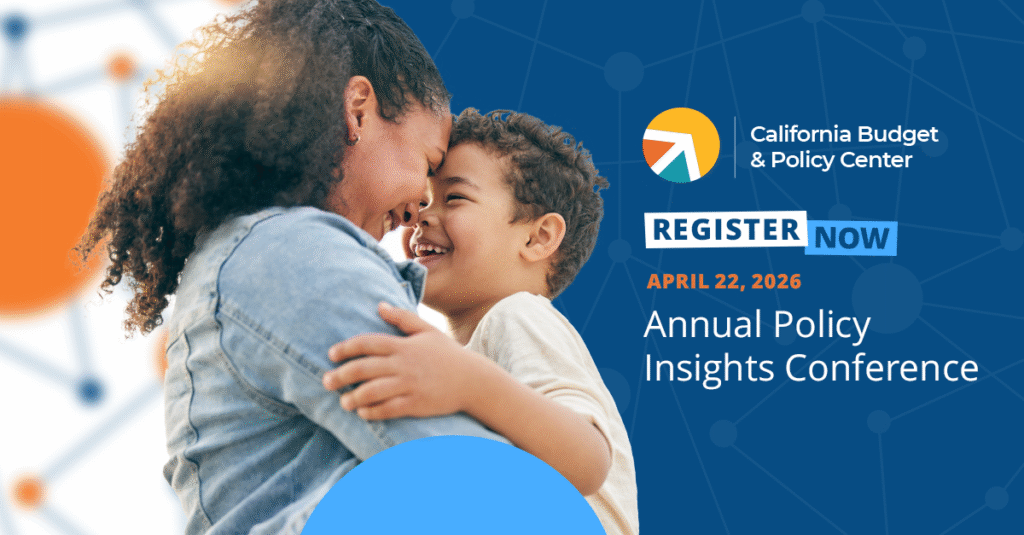The Budget Center communications team chatted with Nishi Nair (she/her), Research Associate at the Budget Center, who conducts research on various topics, including the California state budget, economic security, and gender equity.
This Q&A series is your chance to get to know our team, their areas of expertise, and how their work at the Budget Center supports policy change in California. In this conversation, we’ll explore Nishi’s efforts to understand how public programs can serve the needs of their communities more efficiently, identify gaps in their objectives, and propose solutions to strengthen them.
This interview was edited by Kat Petsalis, Communications Strategist at the Budget Center.
Can you tell us about your role at the Budget Center?
Yes! As a research associate, I do a little bit of everything. When I first started at the Budget Center, I worked across a range of policy areas and spent a lot of time just learning about the state budget process. Over time, I’ve started to focus more on the safety net, especially food and cash assistance programs.
I’ve also been collaborating with Scott, our budget director, on broader budget work — both state and federal — including helping build presentations and explainers for the team and the Budget Academy. It’s a mix of everything, which I really enjoy.
Are there any particular areas of policy that you’re especially drawn to?
Definitely! When I first joined, I wanted to learn a little bit about everything — since this is my first real exposure to public policy. But I’ve become especially interested in the safety net — understanding not just how these programs work, but also how they don’t work and how we can make them better.
Working with our safety net expert, Monica Saucedo, has helped me understand the depth of those gaps and the structural design choices that sometimes make these programs inaccessible or inefficient. And while things at the federal level have been pretty grim lately, it’s been fascinating to see how much the federal government facilitates services for vulnerable Californians. We often think of the state as operating independently, but there’s a deep interconnection, and the new federal budget bill will cause real harm for people here.
Another thing that’s really stuck with me is the relationship between data and storytelling. I’ve come to understand that the numbers we produce at the Budget Center don’t exist in a vacuum. They’re used by advocates to create powerful, persuasive narratives. That interaction between research and advocacy is something I didn’t fully understand before, but it’s now one of my favorite aspects of our work.
What inspired your interest in research and public policy?
Initially, I thought about law because I knew I wanted to do something service-oriented, but I wasn’t sure what form that would take. I majored in sociology because I loved thinking about how and why society functions the way it does. But I realized I was missing the analytical side, so I added economics as a second major.
The combination of these was perfect for me, and I eventually wrote my thesis on the Temporary Assistance for Needy Families (TANF) program. I was fascinated by how the program evolved away from offering direct cash assistance and what that shift said about our societal priorities. After that, I knew I wanted to pursue a career in public policy research.
What is something exciting that you have recently worked on or are currently working on?
I’m really proud of the Federal Budget Reconciliation explainer we just published. It’s the result of several months of work trying to demystify what’s happening at the federal level for people here in California.
Even though the outcomes of this bill are harmful, I think it’s crucial that people understand the impacts — especially when policy processes are so dense and full of jargon. I hope this explainer makes the budget conversation more accessible and empowers people to see how these changes affect their daily lives.
What’s one thing you can’t get through the work day without?
My headphones! I’m always listening to something whether it’s music, podcasts, or even just using the noise cancellation. They’re like a comfort blanket at this point.
How do you like to spend your time outside of work?
I recently moved to Berkeley, so I’ve been exploring my new neighborhood. I love picking a new place to grab a little sweet treat, and I’ve also made it my mission to visit all the public libraries in the area…I didn’t realize there were so many!




